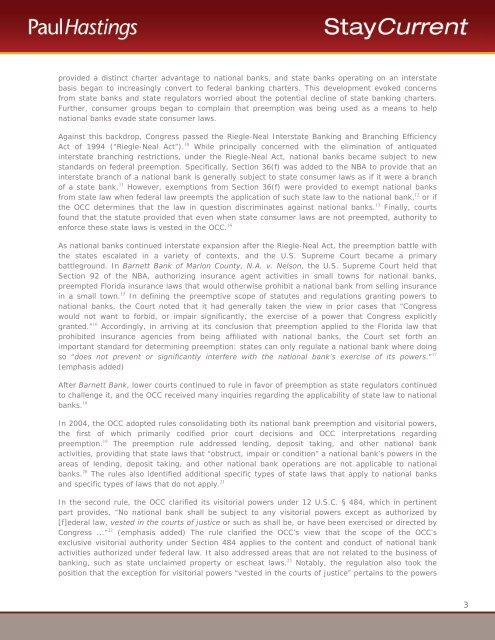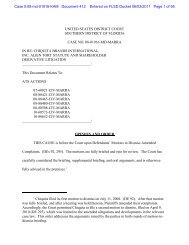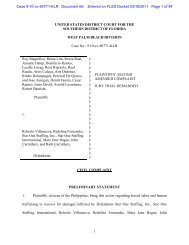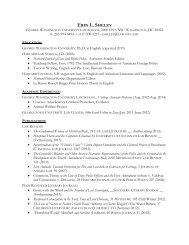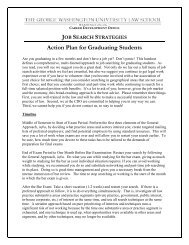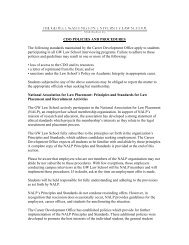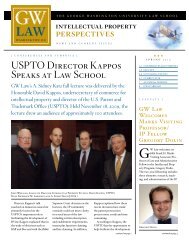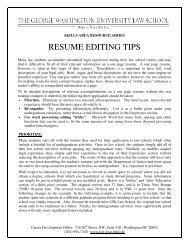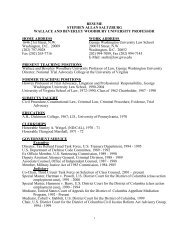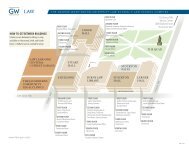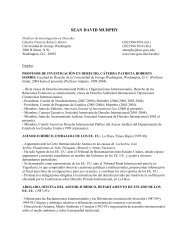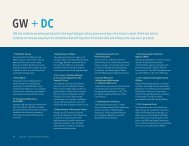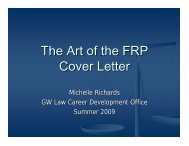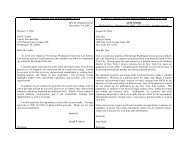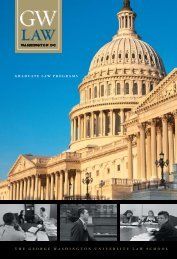CLE Materials for Panel #1 - George Washington University Law ...
CLE Materials for Panel #1 - George Washington University Law ...
CLE Materials for Panel #1 - George Washington University Law ...
Create successful ePaper yourself
Turn your PDF publications into a flip-book with our unique Google optimized e-Paper software.
provided a distinct charter advantage to national banks, and state banks operating on an interstate<br />
basis began to increasingly convert to federal banking charters. This development evoked concerns<br />
from state banks and state regulators worried about the potential decline of state banking charters.<br />
Further, consumer groups began to complain that preemption was being used as a means to help<br />
national banks evade state consumer laws.<br />
Against this backdrop, Congress passed the Riegle-Neal Interstate Banking and Branching Efficiency<br />
Act of 1994 (“Riegle-Neal Act”). 10 While principally concerned with the elimination of antiquated<br />
interstate branching restrictions, under the Riegle-Neal Act, national banks became subject to new<br />
standards on federal preemption. Specifically, Section 36(f) was added to the NBA to provide that an<br />
interstate branch of a national bank is generally subject to state consumer laws as if it were a branch<br />
of a state bank. 11 However, exemptions from Section 36(f) were provided to exempt national banks<br />
from state law when federal law preempts the application of such state law to the national bank, 12 or if<br />
the OCC determines that the law in question discriminates against national banks. 13 Finally, courts<br />
found that the statute provided that even when state consumer laws are not preempted, authority to<br />
en<strong>for</strong>ce these state laws is vested in the OCC. 14<br />
As national banks continued interstate expansion after the Riegle-Neal Act, the preemption battle with<br />
the states escalated in a variety of contexts, and the U.S. Supreme Court became a primary<br />
battleground. In Barnett Bank of Marion County, N.A. v. Nelson, the U.S. Supreme Court held that<br />
Section 92 of the NBA, authorizing insurance agent activities in small towns <strong>for</strong> national banks,<br />
preempted Florida insurance laws that would otherwise prohibit a national bank from selling insurance<br />
in a small town. 15 In defining the preemptive scope of statutes and regulations granting powers to<br />
national banks, the Court noted that it had generally taken the view in prior cases that “Congress<br />
would not want to <strong>for</strong>bid, or impair significantly, the exercise of a power that Congress explicitly<br />
granted.” 16 Accordingly, in arriving at its conclusion that preemption applied to the Florida law that<br />
prohibited insurance agencies from being affiliated with national banks, the Court set <strong>for</strong>th an<br />
important standard <strong>for</strong> determining preemption: states can only regulate a national bank where doing<br />
so “does not prevent or significantly interfere with the national bank’s exercise of its powers.” 17<br />
(emphasis added)<br />
After Barnett Bank, lower courts continued to rule in favor of preemption as state regulators continued<br />
to challenge it, and the OCC received many inquiries regarding the applicability of state law to national<br />
banks. 18<br />
In 2004, the OCC adopted rules consolidating both its national bank preemption and visitorial powers,<br />
the first of which primarily codified prior court decisions and OCC interpretations regarding<br />
preemption. 19 The preemption rule addressed lending, deposit taking, and other national bank<br />
activities, providing that state laws that “obstruct, impair or condition” a national bank’s powers in the<br />
areas of lending, deposit taking, and other national bank operations are not applicable to national<br />
banks. 20 The rules also identified additional specific types of state laws that apply to national banks<br />
and specific types of laws that do not apply. 21<br />
In the second rule, the OCC clarified its visitorial powers under 12 U.S.C. § 484, which in pertinent<br />
part provides, “No national bank shall be subject to any visitorial powers except as authorized by<br />
[f]ederal law, vested in the courts of justice or such as shall be, or have been exercised or directed by<br />
Congress ...” 22 (emphasis added) The rule clarified the OCC’s view that the scope of the OCC’s<br />
exclusive visitorial authority under Section 484 applies to the content and conduct of national bank<br />
activities authorized under federal law. It also addressed areas that are not related to the business of<br />
banking, such as state unclaimed property or escheat laws. 23 Notably, the regulation also took the<br />
position that the exception <strong>for</strong> visitorial powers “vested in the courts of justice” pertains to the powers<br />
3<br />
3


